| Srl | Item |
| 1 |
ID:
111235
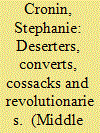

|
|
|
|
|
| Publication |
2012.
|
| Summary/Abstract |
Russians entered Iranian military service in this period in two waves, each wave characterizing a specific period in Iranian-Russian relations. The first was subaltern in origin and came in the form of the deserters from the Russian imperial army who fled to Tabriz in the early nineteenth century and who made a significant contribution to Iranian efforts to build a modern army. The second took place in the late nineteenth-early twentieth century and consisted of representatives of the tsarist military elite, Russian Cossack officers, who came to Iran between 1879 and 1920 and formed the Iranian Cossack Brigade, and their opposites, Caucasian revolutionaries who joined the constitutional movement in order to continue their struggle against the Russian imperial regime. The article raises a series of questions, not only about the extent of Russian influence suggested by the presence of Russian soldiers, but also about its character. Why did Iran place such a high value on Russian military expertise? Who were the Russians who served in the Iranian military? How were they received in Iran? What effect did Iranian society exercise on them and to what extent did the changes transforming Russia affect the roles they played in Iran?
|
|
|
|
|
|
|
|
|
|
|
|
|
|
|
|
| 2 |
ID:
145058
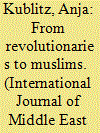

|
|
|
|
|
| Summary/Abstract |
Exploring generational changes and continuities among Palestinian families in Denmark, this article investigates why the children of the fidāᵓīn (fighters) and many of the fidāᵓīn themselves have turned their backs on secular politics and embraced Islam. The Palestinians who arrived in Denmark from Lebanon in the wake of the Lebanese Civil War were members of the Palestinian Liberation Organization and were known as the generation of the revolution (jīl al-thawra). Extending Karl Mannheim's approach to generations, I argue that in order to explain the transition among Palestinians in Denmark from revolutionaries to Muslims we can rely on neither genealogy nor historical context alone, but need to pay equal attention to the structural continuities that crosscut generations. I suggest that rather than conceive of revolutionaries and Muslims as oppositions, we should think of them as substitutions, as liminal becomings that are actualized across historical generations.
|
|
|
|
|
|
|
|
|
|
|
|
|
|
|
|
| 3 |
ID:
095289
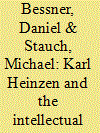

|
|
|
|
|
| Publication |
2010.
|
| Summary/Abstract |
Scholars have long recognized the importance of Karl Heinzen's Mord und Freiheit in the history of terrorist thought. Yet the translation most scholars have relied on-1881s Murder and Liberty-is incomplete. Our new translation reveals four elements omitted from the 1881 translation. First, Heinzen conceived of terrorism as a transnational phenomenon. Second, he provided a material justification for terrorist tactics. Third, Heinzen viewed terrorism as both a tool to impel human society to progress and as a "progressive" tool of violence. Finally, he argued in favor of the primary modern tactic of terrorism-the indiscriminate bombing of civilians.
|
|
|
|
|
|
|
|
|
|
|
|
|
|
|
|
| 4 |
ID:
031391
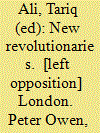

|
|
|
|
|
| Publication |
London, Peter Owen, 1969.
|
| Description |
299p.
|
| Series |
Contemporary issues; no.1
|
|
|
|
|
|
|
|
|
|
|
|
Copies: C:1/I:0,R:0,Q:0
Circulation
| Accession# | Call# | Current Location | Status | Policy | Location |
| 002067 | 322.42/ALI 002067 | Main | On Shelf | General | |
|
|
|
|
| 5 |
ID:
111680
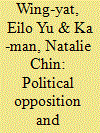

|
|
|
|
|
| Publication |
2012.
|
| Summary/Abstract |
This article examines the nature of political opposition in the Macao Special Administrative Region (MSAR) to give us an understanding of its role in and approach to political reform in the territory. It explores the emergence of the pro-democracy opposition in Macao since the end of the colonial era and the self-perception of pro-democratic opposition groups in the MSAR regime, and argues that the majority of opposition groups perceive themselves as 'loyal' opponents to the current regime. The groups aim at checking the authorities in the scope of the constitution as loyal constituents. Their assumption of this role is the result of several environmental factors, including a relatively weak civil society, a lack of resources and a pro-government media.
|
|
|
|
|
|
|
|
|
|
|
|
|
|
|
|
| 6 |
ID:
162829
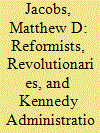

|
|
|
|
|
| Summary/Abstract |
While discussing U.S. foreign policy in Latin America on the campaign trail in October 1960, Massachusetts Senator John F. Kennedy declared that “whatever we do in Cuba itself … we must create a Latin America where freedom can flourish—where long enduring people know … that they are moving toward a better life for themselves and their children—where tyranny, isolated and despised, eventually withers on the vine.”1 Kennedy’s rhetoric illustrated a deep understanding of the issues facing the United States in the Western Hemisphere. No challenge was greater than that of the Cuban Revolution.
|
|
|
|
|
|
|
|
|
|
|
|
|
|
|
|